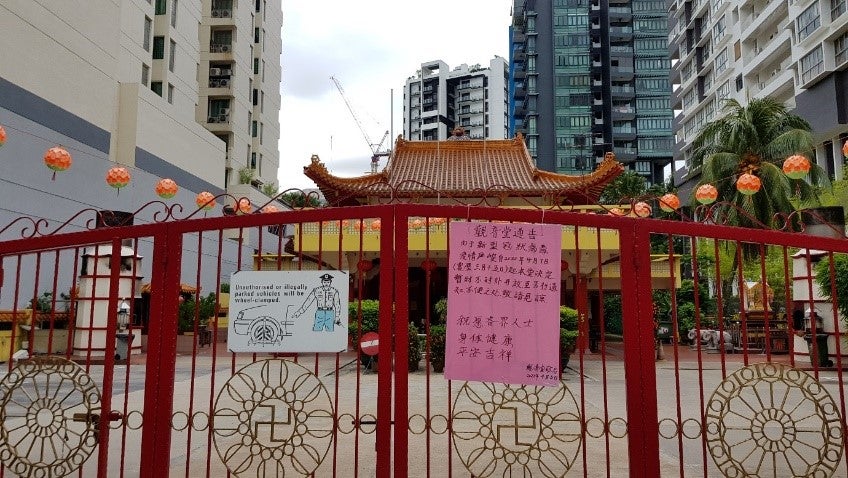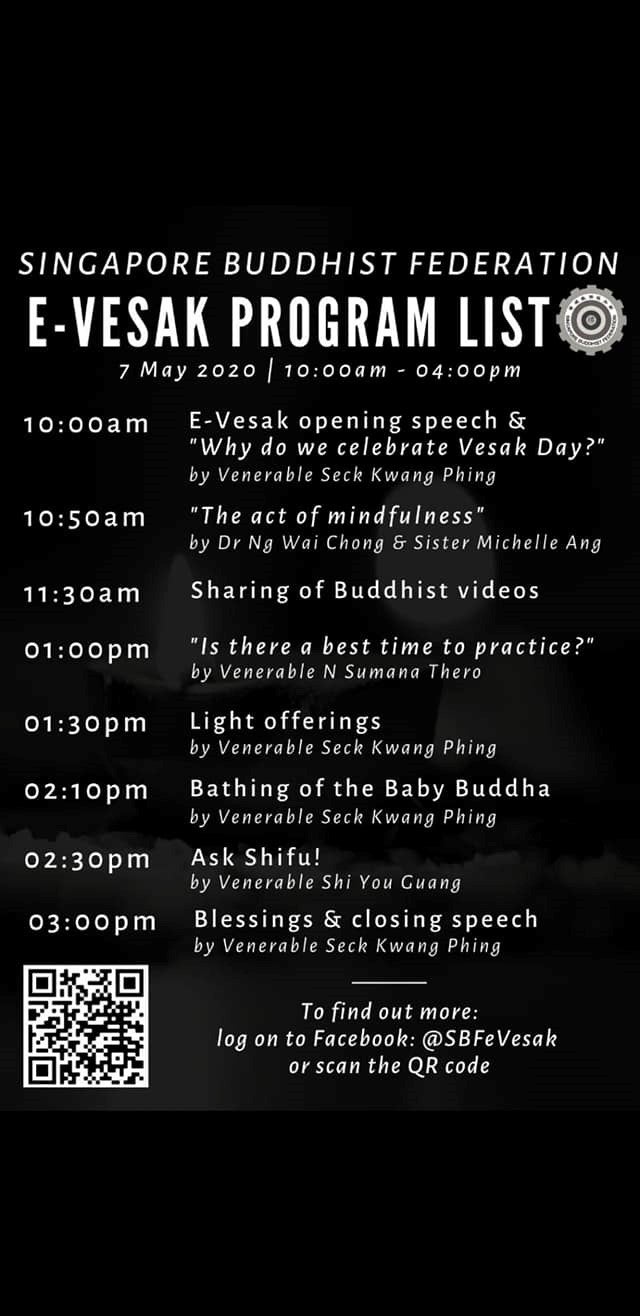Chinese Temples Go Online
contributed by Ying Ruo Show, 18 May 2020
Digital Ethnography of Chinese Temples in Singapore amid the COVID-19 Pandemic (Part 1)
From 7 April to 4 May 2020, the first round of an elevated set of control measures, known as the Circuit Breaker (CB), was implemented in Singapore to minimise the spread of COVID-19. The Circuit Breaker was further extended to 1 June, introducing stricter measures to curb the increasing number of COVID cases. With phased reopening from 2 June, Chinese temples in Singapore are still coping with multiple challenges induced by the pandemic. By conducting digital ethnography, this blog post pieces together a series of technology mediated temple events which happened in Singapore during the pandemic to study how Chinese temples in Singapore adapt and respond to the new situation.
Since early February, two months before the implementation of the Circuit Breaker, when coronavirus cases in Singapore were growing in number, Chinese temples in Singapore had already made a series of adjustments regarding their temple affairs to reduce contact among devotees. The willingness of local temples to cooperate with the Singapore government was evident in their fast response to state regulation. Restricted visiting time for paying respects to ancestors for Qingming was introduced, ancestral tablets in temples were relocated to open spaces, social distancing was enforced in temple spaces and carparks, temperature screening was made compulsory for staff and visitors entering temples, praying for divination lot was disallowed, and a series of celebrations of deities’ birthdays was postponed.
After stricter controls were introduced in Singapore with the Circuit Breaker, Chinese temples, clearly belonging to “non-essential services” under the government’s categorization, were ordered close. All celebrations, banquets and Chinese opera performances were postponed indefinitely if not cancelled.

A vegetarian hall in Balestier area of Singapore closed to public during the Circuit Breaker Period (source: photo by author, April 2020)
Online Veneration of Ancestors
Amidst the heightened uncertainty, Chinese temple-goers, usually elderly, are now left with no choice but to stay at home. They can no longer pray in the temples or interact face-to-face with their friends in the temples as a leisurely way to pass their time. To mitigate the forced separation of temples from their devotees, temples began to go digital to meet the challenges of this new reality. Although Buddhist priests conducted dharma services behind closed doors (bimen lichan 閉門禮懺), their services were live-streamed through Facebook. Not only “Dedication of Merit to the Departed Ritual for Qingming” (Qingming chaodu fahui 清明超度法會) services were livestreamed; “Online veneration of ancestors” services (xianshang jizu 綫上祭祖) were particularly appreciated by people during the Qingming Festival. Temples such as Kong Meng San Phor Kark See Monastery 光明山普覺禪寺and Fo Guang Shan 佛光山 both offered such services.
At the Kong Meng San website, an “ancestor-praying package” including two LED lights (as a substitute for candles), one “fortune cake” (fagao 發糕), one “fortune bag” (fubao 福包), two oranges, two apples, and a bouquet of flowers, can be purchased online at S$48. After payment, temple personnel will then proceed with the praying services on the descendants’ behalf. Although Kong Meng San has previously introduced the “Pray to Buddha online” (xianshang baofo 綫上拜佛) service in 2015, the temple expected an increase of 6 times in the number of users for the service this year. As for Fo Guang Shan, demand also exceeded supply for their “online veneration of ancestors” service. The temple is even considering to make the service a permanent one after the pandemic is over, which implies a long-lasting impact to the structure of traditional Chinese ancestor worship.
Bathing Buddha in the Cloud
During this pandemic, the Medicine Buddha has been invoked as the dispeller of diseases and defilements. As a “Vesak Day Special”, Kong Meng San has organised an online Medicine Buddha name chanting activity. The merits of devotees’ chanting will be dedicated towards the relief of the suffering and ailments of those going through a difficult time. Recitation counts can be submitted online from 6 May to 31 May 2020, and the monastery is targeting at 100 million counts by the end of May. Besides of that, a “bathing Buddha in the cloud” (yunduan yufo雲端浴佛) service was offered by some temples during Vesak Day. One can perform the popular activity of bathing baby Buddha with just a click.
The Singapore Buddhist Federation and the Buddhist Library both introduced a “e-Vesak Day” programme (xianshang weisai jie 綫上衞塞節); as Buddhists watched the livestreaming of Vesak celebrations online, they can at the same time bathe the Buddha physically at home. According to a young 14-year old devotee, she was initially disappointed about celebrating Vesak Day virtually, as she would have preferred a face-to-face experience. “However, COVID-19 has taught us about impermanence. I am grateful that I had a chance to do it virtually. It was a unique experience that I will cherish.”

Singapore Buddhist Federation E-Vesak Day Program List (Source: Facebook Page of Singapore Buddhist Federation)
Some smaller temples also relied more heavily on WhatsApp chat groups to share their online activities with their contacts. For temples celebrating the birthdays of deities (March and April are months with many Chinese deities’ birthdays), it is possible to purchase “deity robes” and blessing lamps online, and to use the “celebration donation service” to wish deities an electronic happy birthday.
The abundance of digital data during the period of social restriction undeniably makes a digital ethnography more feasible than before. However, new methods in conducting ethnography without the embodied experience of “traditional” ethnography fieldwork also prompts us to rethink the many implications of de-sensorialization and disembodiment of Chinese religion in modern Singapore.
(to be continued in Part 2)
Ying Ruo Show received her PhD in Chinese Studies at the National University of Singapore in 2017. She is currently a Postdoctoral Fellow in the Asia Research Institute at the National University of Singapore. She was Visiting Fellow at the Nalanda-Sriwijaya Centre, ISEAS-Yusof Ishak Institute, and Center for Religious Studies, Ruhr University of Bochum. Her research interests include lay Buddhist narratives, gender and religion, and the history of the Chinese diaspora in Southeast Asia.
Disclaimer: The views and opinions expressed in this article are those of the authors and do not necessarily reflect the position of the blog editorial team or the Asia Research Institute.
South Asia | Southeast Asia | East Asia | Other Places | Hinduism | Buddhism | Islam | Christianity | Other Religions

